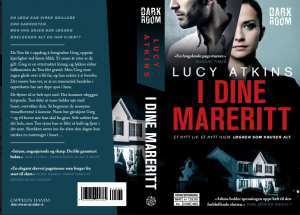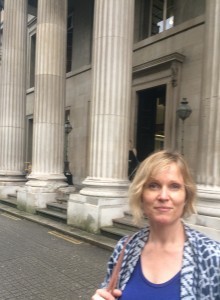Lucy Atkins's Blog, page 8
September 28, 2016
The Other Child Norwegian translation
The Other Child came out in Norwegian translation this week, hooray. Thank you Capellen Damm! They’ve given it a fabulous dark Scandi Noir cover and a new ominous title. (I did wonder what ‘slutten’ means though…)

September 6, 2016
BBC Radio Oxford book talk
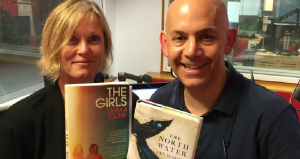 Last month’s selection
Last month’s selectionBook Talk:
On BBC Oxford 6.30pm tonight I’ll be discussing The Wonder, the new psychological suspense novel by The Room author Emma Donoghue and the brilliant new Ann Patchett novel Commonwealth. I’ll also be going on about a few other books I’m excited about reading this month including new novels by Ian McEwan and Jonathan Safran Foer (his first in 11 years!).
Here’s a great review of the Ann Patchett
& more about Emma Donoghue

June 29, 2016
‘Research’ trip to the South of France
It was recently our 19th wedding anniversary. The novel I’m now writing is set, in part, in the South of France. When I was growing up we used to go camping there every year and it’s very dear to me.
All this called for an, ehem, ‘research trip.’ It was bliss (and actually quite useful for my book).
Here are a few pictures I took for inspiration.

May 29, 2016
How to Get Published Masterclass: further info for writers
This was a great even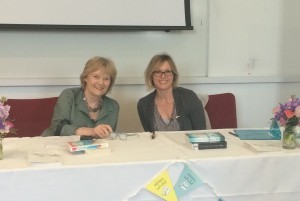 t, a big lively audience with lots of questions.
t, a big lively audience with lots of questions.
I said I’d put some of the links up, so here goes:
A few Good Creative Writing Courses:
We talked about some high-impact (though not cheap) creative writing courses that can boost your writing skills and help with contacts:
This is the weekend Festival of Writing in York – a great place to meet agents, get critiques from editors, and generally find out about the business of getting published.
We also talked about pitching to an agent on Twitter. You can read more about that here in this Bookseller article
Good luck with your book – do feel free to ask me any questions. And I’d love to hear how it goes for you.

May 27, 2016
Daisy in Chains author Sharon Bolton
 I’ve just finished Daisy in Chains, the latest twisty crime novel by Sharon Bolton. I was intrigued by the subject and the skill so I sat down with Sharon to ask her about it….
I’ve just finished Daisy in Chains, the latest twisty crime novel by Sharon Bolton. I was intrigued by the subject and the skill so I sat down with Sharon to ask her about it….
LA Tell us a bit about Daisy In Chains
SB Hamish Wolfe, a handsome, charismatic former-surgeon, is serving a whole life tariff in Parkhurst prison for multiple murder. He has always protested his innocence and his legion of fans (mostly adoring women) campaign tirelessly for his release. Maggie Rose is a criminal barrister and the best-selling author of true crime books. Enigmatic and reclusive, Maggie has no interest in Hamish’s case. He is determined that she – and only she – can get his conviction overturned. Daisy in Chains explores the dangerous hold that notorious serial killers have over vulnerable women, and what some women are prepared to sacrifice in order to find true love.
LA Why on earth would any woman be attracted to a man who is in prison for appalling crimes?
SB I don’t think there’s any one reason. A desire to share his notoriety, to absorb some of his status, even to gain financially will factor with many of these women. Others will be very damaged themselves, maybe even addicted to relationships with violent men – a man who’s locked up will present much less of a threat than one on the loose. Prison romances have been compared, by some psychologists, to traditional courtly love – the man gives unconditional adoration to his lady, expecting nothing in return and the romance never gives way to the drudgery of real life. Most disturbing of all, though, is the theory that some women are sexually excited by the thought of violence, and are driven primarily by the opportunity to kill by proxy.
LA The victims in your book are overweight women. Why?
SB I was particularly interested in the idea that society cares more about some victims than others. The three (possibly four) victims in Daisy In Chains are plus sized women and there is much speculation in the book that their deaths were considered less important than they would have been, had the women each been a trim size ten. During my research, I was particularly struck by how often and how openly women of size are abused. Verbal and even physical attacks are common and condoned. One of the darker aspects of this prejudice is the assumption, on the part of a number of men, that fat women are sexually promiscuous. So many large women talk about the number of men who try to pick them up in bars because they assume they’ll be desperate and easy. These men get very unpleasant when turned down. Lesley Kinsel, author of Two Whole Cakes, puts it very well, ‘Fat women learn early that they should take male attention wherever they can get it, because what self-respecting man would want to fuck a fat woman?’ she says. ‘She’ll take what she can get, regardless of what she actually desires and consider herself lucky. The idea of such a woman saying no is inconceivable.’
LA Your plot is brilliantly twisty with cunning decoys and red herrings – as a writer I found myself intrigued by your techniques – do you plan the whole novel out before you begin?
SB I plan as much as I possibly can – and then make it up as I go along. The finished book rarely bears much resemblance to my original plan but that doesn’t bother me. The detailed plan gives me confidence that the story is there, even if it eventually turns out quite different.
LA What do you like best – and least – about being a novelist?
SB I love hearing from readers who’ve enjoyed my books, especially when one has touched them personally, or if they see something in the story that I never intended. When a reader sees something new in one of my books, I see it as the story having taken flight, and having a life of its own without me.
There is very little I don’t like, but I am always acutely conscious of the pressure on authors like me who write for the big commercial publishing houses. We’re expected to a) produce a book a year, b) make each book better than the last and c) sell lots of copies. This isn’t a complaint, because I do appreciate that I’m in a privileged and much-envied position, but the knowledge that it could all end very quickly does keep me awake some nights.
Daisy in Chains is published by Bantam Press on 2nd June, 2016 – buy one: Waterstones
More information: Sharon Bolton

How to get a literary agent to read your submission
Finding a good literary agent is vital if you want to go down the conventional publishing route. But it can be really hard to get noticed. When I was starting out the literary agent world seemed deeply intimidating. To save you from going through such paranoia and stress, my literary agent Judith Murray of Greene & Heaton and I put together some myths and tips to help you approach the agent of your dreams.
First, the MYTHS….
 Judith Murray
Judith Murray
Myth 1: ‘I don’t need a literary agent, I’ll just go straight to the editor/publisher’. Reality: You could, but your chances of getting an editor to actually read your book let alone buy it are teeny (unless they are a small publisher actively seeking submissions, which is rare, or unless you are planning to self-publish in which case you’re free of all this trauma). Agents save overburdened editors time. Editors trust good agents – they take their submissions seriously: ie. they actually read them.
Myth 2: ‘Agents get too many submissions, they don’t want mine too’. Reality: Agents are indeed inundated. Judith gets 30 submissions a day – but they do WANT to hear from you. They are always looking for the next talented, marketable writer.
Myth 3: ‘Even if I do send it to an agent it’ll probably go on a slush pile’. Reality: Judith looks at every single one of those 30 daily submissions.
Myth 4: ‘Only people with literary connections get published, there’s no hope for an unknown like me even though my book is a work of genius’. Reality: Agents take on unknown writers all the time. It’s their job to spot talent. The key is not to put them off with an inept first approach (see below).
Judith says: ‘We’re looking for a reason to stop reading…’
Don’t give them that reason!
 Five quickest ways to make Judith stop reading your emailed submission:
Five quickest ways to make Judith stop reading your emailed submission:
1. Make spelling or grammatical errors
2. Write more than a paragraph or two in a waffly or clumsy style.
3. Use emoticons, different fonts, colours or any other silly gimmicks in your email.
4. Make inflated comparisons ‘I’m the next JK Rowling/Proust/Salman Rushdie’ or diss other successful writers (‘I’ve always felt JK Rowling’s prose is flabby. My own, in contrast…’)
5. Send a ten page synopsis or otherwise ignore the guidelines for submissions set out clearly on the agency website.
And…five ways to make her read on:
1. Avoid all the pitfalls above
2. Be succinct, polite, clear and articulate in your covering email
3. Mention any professional writing you’ve done – journalism, screenplays, documentary film making (that piece in the Church Gazette in 1998 doesn’t count)
4. Mention any prizes, awards, or competitions you have won or been shortlisted for (again, the Parish council short story comp, no; the Bridport or another big short story prize, yes.)
5. Briefly – one sentence – give the ‘elevator pitch’ of your novel (ie. convey its genius). You can if you want to mention where you think it might fit the market, but don’t be inflated or mad (for instance, just say something like ‘my influences include…’)
Literary agents WANT to hear from you. You are not inconveniencing them by sending them your work. But they are extremely busy. So approach them professionally and stick to their submissions guidelines or you could lose out, however good you are.
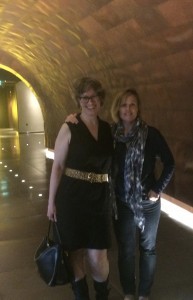 Judith & I in a copper tunnel last month
Judith & I in a copper tunnel last month
And…if you can get to London tomorrow (Sat 28th May), come to the Greenwich Book Festival for a masterclass on How to Get Published

How to approach a literary agent
Finding a good literary agent is vital if you want to go down the conventional publishing route. But it can be really hard to get noticed. When I was starting out, the literary world seemed deeply intimidating. To save you from such paranoia and stress, my literary agent Judith Murray of Greene & Heaton and I put together some myths and tips to help you approach the agent of your dreams.
First, the MYTHS….
 Judith Murray
Judith Murray
Myth 1: ‘I don’t need a literary agent, I’ll just go straight to the editor/publisher’. Reality: You could, but your chances of getting an editor to actually read your book let alone buy it are teeny (unless they are a small publisher actively seeking submissions, which is rare, or unless you are planning to self-publish in which case you’re free of all this trauma). Agents save overburdened editors time. Editors trust good agents – they take their submissions seriously: ie. they actually read them.
Myth 2: ‘Agents get too many submissions, they don’t want mine too’. Reality: Agents are indeed inundated. Judith gets 30 submissions a day – but they do WANT to hear from you. They are always looking for the next talented, marketable writer.
Myth 3: ‘Even if I do send it to an agent it’ll probably go on a slush pile’. Reality: Judith looks at every single one of those 30 daily submissions.
Myth 4: ‘Only people with literary connections get published, there’s no hope for an unknown like me even though my book is a work of genius’. Reality: Agents take on unknown writers all the time. It’s their job to spot talent. The key is not to put them off with an inept first approach (see below).
Judith says: ‘We’re looking for a reason to stop reading…’
Don’t give them that reason!
 Five quickest ways to make Judith stop reading your emailed submission:
Five quickest ways to make Judith stop reading your emailed submission:
1. Make spelling or grammatical errors
2. Write more than a paragraph or two in a waffly or clumsy style.
3. Use emoticons, different fonts, colours or any other silly gimmicks in your email.
4. Make inflated comparisons ‘I’m the next JK Rowling/Proust/Salman Rushdie’ or diss other successful writers (‘I’ve always felt JK Rowling’s prose is flabby. My own, in contrast…’)
5. Send a ten page synopsis or otherwise ignore the guidelines for submissions set out clearly on the agency website.
And…five ways to make her read on:
1. Avoid all the pitfalls above
2. Be succinct, polite, clear and articulate in your covering email
3. Mention any professional writing you’ve done – journalism, screenplays, documentary film making (that piece in the Church Gazette in 1998 doesn’t count)
4. Mention any prizes, awards, or competitions you have won or been shortlisted for (again, the Parish council short story comp, no; the Bridport or another big short story prize, yes.)
5. Briefly – one sentence – give the ‘elevator pitch’ of your novel (ie. convey its genius). You can if you want to mention where you think it might fit the market, but don’t be inflated or mad (for instance, just say something like ‘my influences include…’)
Literary agents WANT to hear from you. You are not inconveniencing them by sending them your work. But they are extremely busy. So approach them professionally and stick to their submissions guidelines or you could lose out, however good you are.
 Judith & I in a copper tunnel last month
Judith & I in a copper tunnel last month

May 12, 2016
Location Scouting at the Hunterian Museum
Yesterday I did a spot of location scouting at the Hunterian Museum, inside the Royal College of Surgeons where I’m planning a key scene in the novel I’m writing now. It’s a fascinating place – for non-medics like me it’s all about beautiful and creepy oddities; an eighteenth century ‘abscess opener’, a necrotic skull, the death mask of Sir Isaac Newton – I even found a case of beautiful, iridescent beetles (there’s a beetle theme going on in my latest book too).
Find out more here: Hunterian Museum
 Hunterian Museum at The Royal College of Surgeons
Hunterian Museum at The Royal College of Surgeons
May 5, 2016
Sainsbury’s ‘Secrets & Lies’ promo deal
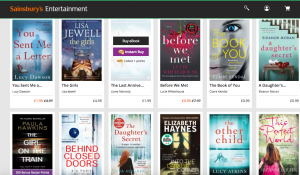 Delighted to be included in this Sainsbury’s promotion. Some fantastic psychological thrillers at total bargain prices, for a limited time only:
Delighted to be included in this Sainsbury’s promotion. Some fantastic psychological thrillers at total bargain prices, for a limited time only:
‘If you loved Gone Girl and Girl on a Train, our Secrets and Lies is a hand-picked collection of the best new psychological thrillers where everything is most definitely not what it seems. Titles start at a very cunning 99p’
Have a look here: https://www.sainsburysentertainment.c...


